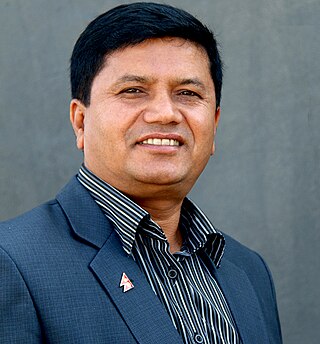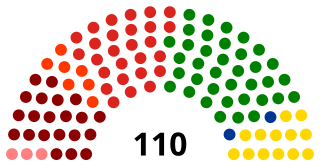Related Research Articles

The Communist Party of Nepal (Unified Marxist–Leninist) (Nepali:नेपालकम्युनिष्टपार्टी(एकीकृतमार्क्सवादी-लेनिनवादी),romanized: nēpāla kamyuniṣṭa pārṭī(ēkīkr̥ta mārksavādī-lēninavādī);abbr. CPN (UML)) is a communist political party in Nepal. The party emerged as one of the major parties in Nepal after the end of the Panchayat era.

Biratnagar is a metropolitan city in Nepal,which serves as the capital of Koshi Province. With a Metropolitan Urban Agglomeration population of 244,750 as per the 2021 census,it is the largest city and fastest growing city in the province and also the headquarters of Morang district. As per the preliminary report of 2022 Nepal census,Biratnagar Metropolitan has an estimated city population of 244,750 excluding the suburban areas which are now very well connected to the old town. It is the administrative center of the Greater Birat Development Area which incorporates the cities of Biratnagar and its suburbs and towns of-Itahari-Gothgau-Biratchowk-Dharan primarily located on the Koshi Highway in Eastern Nepal,with an estimated total urban agglomerated population of 804,300 people in 159,332 households including the town of Ithari. Biratnagar is located 399 km (248 mi) east of the capital,Kathmandu,and 6 km (3.7 mi) north of the bordering town of Jogbani in the Indian state of Bihar. It is one of the major entry point in Nepal for Businessmen as well as Tourists who come to visit Nepal for various purposes.
Chandra Prakash Mainali more commonly known as C. P. Mainali is a communist politician in Nepal and former Deputy Prime Minister of Nepal.

Upendra Yadav is a Nepalese politician who is currently Deputy Prime Minister of Nepal and also served as the chairman of the People's Socialist Party,Nepal from 2020 until 2023.

Prakash Man Singh is a Nepalese politician and a leader of the Nepali Congress. He is the son of Nepali politician Ganesh Man Singh. He has also served as the Deputy Prime Minister and Minister of Local Development and Federalism in Sushil Koirala's Cabinet.
Tilak Pariyar is a Nepalese politician currently serving as the Governor of Karnali Province. He was appointed Governor,as per the Article 163 (2) of the Constitution of Nepal by the President Bidya Devi Bhandari on the recommendation of the Council of Ministers of the Government of Nepal on 9 November 2021. He previously served as the 2nd Governor of Province No. 2 of Nepal. He is former member of the 1st Nepalese Constituent Assembly from Banke-1 constituency.

Rabindra Prasad Adhikari was a Nepali politician and three-time parliamentarian,belonging to the Nepal Communist Party (NCP). He was Minister of Culture,Tourism and Civil Aviation from 16 March 2018 until his death in a helicopter crash. He was the Kaski District secretary of the party. In the 2008 Constituent Assembly election,Adhikari was elected from the Kaski-3 constituency,with 13,386 votes. In the 2013 Constituent Assembly election,he was re-elected from the Kaski-3 constituency,with 15,456 votes. In 2017,CPN-UML candidate Rabindra Adhikari won parliamentary elections from Kaski Constituency No. 2. Representing the left alliance,Adhikari secured 27,207 votes to defeat Nepali Congress candidate Dev Raj Chalise,who got 18,661 votes. After his demise,his wife Bidya Bhattarai won Kaski Constituency-2 with a wide margin of 8,403 votes in the by-election. Bhattarai secured 24,394 votes,while her nearest contender Khem Raj Poudel from main opposition Nepali Congress got 15,991. Likewise,Socialist Party's Dharma Raj Gurung got 1,922 votes. He authored the books Constituent Assembly,Democracy and Re-structuring.

Keshar Jung Rayamajhi was a Nepalese politician. He was a leading figure in the communist movement in the country,but later turned into a royalist. Rayamajhi hails from a landlord Chhetri family in Tansen,Palpa district.

Gandaki Province ),is one of the seven federal provinces established by the current constitution of Nepal which was promulgated on 20 September 2015. Pokhara is the province's capital city. It borders the Tibet Autonomous Region in Southwest China to the north,Bagmati Province to the east,Karnali Province to the west,and Lumbini Province and Bihar of India to the south. The total area of the province is 21,504 km2 - constituting 14.57% of Nepal's total area. According to the latest census,the population of the province was 2,479,745. The newly elected Provincial Assembly adopted Gandaki Province as the permanent name by replacing its initial name Province No. 4 on 27 April 2023. Surendra Raj Pandey is the present chief minister of Gandaki Province.

The Provincial Assembly of Bagmati Province also known as the Bagmati Pradesh Sabha,is a unicameral governing and law making body of Bagmati Province,one of the seven provinces in Nepal. The assembly is seated in the provincial capital at Hetauda in Makwanpur District at the Regional Educational Directorate Office. The assembly has 110 members of whom 66 are elected through first-past-the-post voting and 44 of whom are elected through proportional representation. The term of the assembly is five years unless dissolved earlier.

The Provincial Assembly of Gandaki Province also known as the Gandaki Province Sabha,is a unicameral governing and law making body of Gandaki Province,one of the seven provinces in Nepal. The assembly is seated at the provincial capital Pokhara in Kaski District at the Urban Development Training Centre. The assembly has 60 members of whom 36 are elected through first-past-the-post voting and 24 of whom are elected through proportional representation. The term of the assembly is five years until dissolved earlier.

In the Federal Democratic Republic of Nepal,a governor is the constitutional head of each of the seven provinces. Sub-Article 1 of Article 161 of the Constitution of Nepal says that the Governor is a representative of the Government of Nepal in each province.d The governor is appointed by the president of Nepal recommended by federal cabinet for a term of five years and holds office at the president's pleasure. A person who has once served as the governor of a province cannot be appointed to the same post twice. The governor is de jure head of the provincial government;all its executive actions are taken in the governor's name. However,the governor must act on the advice of the popularly elected council of ministers,headed by the chief minister,which thus holds de facto executive authority at the province-level. The Constitution of Nepal also empowers the governor to act upon his or her own discretion,such as the ability to appoint or dismiss a ministry,recommend president's rule for the president's assent.

Communism in Nepal traces its roots back to the pro-democracy movement of 1951,and the subsequent overthrow of the autocratic Rana regime and the establishment of democracy in Nepal. The communist movement in Nepal has split into factions multiple times and multiple factions have come together into a single fold at times as well. It has a history of getting banned from open political discourse,as well as multiple instances of embracing guerrilla insurgency,most notably,the Maoist insurgency in the 1990s and early 2000s that led to the Nepalese Civil War,claiming at least 17,000 lives.

The First Federal Parliament of Nepal,consisting of the House of Representatives and the National Assembly,was elected via the 2017 legislative,provincial and local elections.
Amik Sherchan is a Nepalese politician and current Governor of Lumbini Province of Nepal. He is former chairman of Janamorcha Nepal. He served as the Deputy Prime Minister &Health and Population Minister of Nepal in the interim government under Girija Prasad Koirala cabinet. He also served as the 2nd Governor of Gandaki Province of Nepal. He is active as a politician and prominent leader since 1967. He was elected as a member of the Pratinidhi Sabha and Member of 1st Constituent Assembly from Chitwan.
Pradeep Nepal is a Nepali communist politician belonging to CPN. He also a former government minister under Manmohan Adhikari cabinet. He has also a writer,and has published at least 16 novels and ten short stories collections.

General elections were held in Nepal on 20 November 2022 to elect the 275 members of the House of Representatives. There were two ballots in the election;one to elect 165 members from single-member constituencies via FPTP,and the other to elect the remaining 110 members from a single nation-wide constituency via party-list proportional representation.

At the end of 2020,a major split in the Nepal Communist Party (NCP) revived the Communist Party of Nepal and the Communist Party of Nepal.
The first Koshi Provincial Assembly was elected by the 2017 provincial elections. 93 members were elected to the assembly,56 of whom were elected through direct elections and 37 of whom were elected through the party list proportional representation system. The term of the assembly started on 5 February 2018 and ended in September 2022. Sher Dhan Rai and Bhim Acharya served as chief ministers from CPN and Rajendra Kumar Rai served as chief minister from CPN during the term of the assembly. Pradeep Kumar Bhandari served as the speaker of the assembly and Saraswati Pokharel served as deputy speaker.
The first Gandaki Provincial Assembly was elected by the 2017 provincial elections. 60 members were elected to the assembly,36 of whom were elected through direct elections and 24 of whom were elected through the party list proportional representation system. The term of the assembly started on 4 February 2018 and ended in September 2022. Prithvi Subba Gurung from the CPN (UML) and Krishna Chandra Nepali Pokharel from the Nepali Congress served as chief ministers during the term of the assembly. Netra Nath Adhikari served as the speaker of the assembly and Srijana Sharma served as the deputy speaker.
References
- 1 2 3 "काे हुन् सोमनाथ प्यासी ? पञ्चायत सदस्य, सांसद हुँदै प्रदेश १ प्रमुख सम्म" [Who is Somnath Pyasi?]. Purbeli News (in Nepali). 2019-11-04. Retrieved 2020-06-05.
- 1 2 "कम्युनिष्ट नेता सोमनाथ अधिकारी (प्यासी) को जीवन यात्रा" [About communist leader Somnath Adhikari Pyasi]. Nepalipatra. Retrieved 2020-06-05.
- ↑ "Government picks new governors after sacking Deuba-period appointees". kathmandupost.com. Retrieved 2020-06-04.
- ↑ "All seven provinces get new heads". The Himalayan Times. 2019-11-05. Retrieved 2020-06-04.
- ↑ "नयाँ प्रदेश प्रमुखको नालीबेली : पूर्वप्रधानपञ्चदेखि विप्लव छाडेकासम्म !" [History of newly appointed provincial governors]. Online Khabar. Retrieved 2020-06-05.